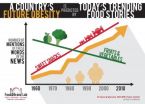(Press-News.org) A special type of synthetic sugar could be the latest weapon in the fight against superbugs.
A team of scientists from The University of Queensland and Queensland biotechnology company Alchemia have discovered a potential new class of antibiotics inspired by sugar molecules produced by bacteria.
New antibiotics to which bacteria are unlikely to develop resistance are urgently needed to combat the rise of superbugs - drug resistant bacteria.
The research, led by Professor Matt Cooper and Dr Johannes Zuegg from UQ's Institute for Molecular Bioscience (IMB) in partnership with Alchemia, was published in scientific journal Nature Communications.
Professor Cooper, Director of the IMB Centre for Superbug Solutions, said bacteria are less likely to become resistant to an antibiotic based on a modified version of their own sugar.
"Bacteria have cell walls similar to the walls of a brick house, except instead of mortar the walls are held together by sugar polymers," Professor Cooper said.
"But if you add one of our modified sugar molecules, they stop the linking process, destroying the cell wall and killing the bacteria."
"The cell wall has been a target for antibiotics such as penicillin and vancomycin before, but the difference here is that we are stopping a centrally important part of the cell wall linking process."
Dr Zuegg said the team examined hundreds of versions of Alchemia's modified sugar molecules to find those that will kill bacteria and are non-toxic to human cells.
"Most molecules screened to become drugs have a flat, planar shape, whereas these molecules are three dimensional," Dr Zuegg said.
"This means we can build on the sugar core in a variety of ways to make thousands of different combinations in three dimensional space.
INFORMATION:
The team included researchers from University of Warwick in the UK, Academia Sinica in Taiwan and Ghent University in Belgium.
The work was supported by Australian and overseas organisations including Alchemia, the National Health and Medical Research Council, Bayer Animal Health and the Wellcome Trust.
Contact: IMB Communications, 0418 575 247, communications@imb.uq.edu.au, 0439 651 107
Swedish researchers at Uppsala University and the Karolinska Institute have found that genes that control the biological clocks in cells throughout the body are altered after losing a single night of sleep, in a study that is to be published in the Journal of Clinical Endocrinology and Metabolism.
"Previous research has shown that our metabolism is negatively affected by sleep loss, and sleep loss has been linked to an increased risk of obesity and type 2 diabetes. Since ablation of clock genes in animals can cause these disease states, our current results indicate that ...
TORONTO, ON - When Julie compares her husband George to her friend's husband Sam, she can't help but notice that Sam is better is better at helping his children with homework. But rather than be upset about George's shortcomings in the children's homework arena, Julie reasons that since she enjoys doing homework with their children, it's not that important that George do it.
What Julie has just done is protect her partner (and their relationship!) from the negative implications of her own comparison. But not all members of a couple engage in these justifying explanations ...
Information embedded within DNA has long contributed to biodiversity conservation, helping to reconstruct the past history of species, assess their current status, and guide strategies for their protection. A new study shows that the entire genome of hard to study species may now be available to scientists without the need to handle or even see their study organism, opening up the field of conservation genomics to the use of non-invasive sampling techniques.
Endangered and elusive species by definition may be both rare and difficult to locate. As a result, conservation ...
COLUMBUS, Ohio - If there's one thing advertisers think they know, it is that sex and violence sell.
A new analysis, however, provides some of the best evidence to date that this widely accepted adage just isn't true.
Researchers analyzed the results of 53 different experiments (a so-called meta-analysis) involving nearly 8,500 people, done over 44 years. All of these experiments examined some facet of the question of whether sexual or violent media content could help sell advertised products.
When all the results are considered together, the overall conclusion, with ...
'Fatherhood effect' is average weight gain of 3.5 to 4.5 pounds
Non-fathers lose weight during same time period
Key time for pediatricians to counsel fathers, who often don't have their own doctors
CHICAGO --- All those leftover pizza crusts you snatch from your kids' plates add up. Men gain weight after they become fathers for the first time whether or not they live with their children, reports a large, new Northwestern Medicine study that tracked the weight of more than 10,000 men from adolescence to young adulthood.
The typical 6-foot-tall man who lives ...
Juvenile inmates are much more likely to be hospitalized for mental health problems than children and teenagers who are not incarcerated, according to a new study from the Stanford University School of Medicine.
In addition, the hospital stays of these inmates are longer, suggesting that their underlying mental health problems are worse.
The new study, which will be published online July 21 in the Journal of Adolescent Health, examined almost 2 million hospitalizations of California boys and girls over a 15-year period. Mental health diagnoses were responsible for ...
CHARLOTTESVILLE, VA (JULY 21, 2015). French researchers used clinical examinations and magnetic resonance imaging (MRI) studies to determine whether retired professional rugby players experience more serious symptoms of cervical spine degeneration than people in the general population. To the best of the authors' knowledge, this is the largest study of its kind covering any professional contact sport, and it confirms greater cervical spine degeneration in former rugby players. The research findings are reported and discussed in the article, "Clinical and radiological cervical ...
ANN ARBOR, Mich. -- It's a tale of two tests: one for early signs of cervical cancer, the other for a sexually transmitted disease. But a new study suggests that a change in the recommended schedule for one may have dramatically lowered the chances that young women would get the other.
Results published by a University of Michigan team shows the unintended consequences of changes to national health test guidelines: the potential for doctors to fall behind on ordering other tests that screen for serious health problems.
In this case, the two tests are Pap smears and ...
What you're reading now secretly tells you whether your country will be skinnier or fatter in three years. After analyzing 50 years of all the food words mentioned in major newspapers like the New York Times and London Times, a new Cornell study shows that the food words trending today in 2015 will predict a country's obesity level in three years - in 2018.
"The more sweet snacks are mentioned and the fewer fruits and vegetables that are mentioned in your newspaper, the fatter your country's population is going to be in 3 years, according to trends we found from the past ...
(PHILADELPHIA) -- African American men are more likely to develop prostate cancer than European American men, and are also more than twice as likely to die from it. Although there are many reasons that contribute to this health disparity, new research shows that African American men may have a distinctly different type of prostate cancer than European American men, according to new genomic fingerprinting results.
"This study, this line of research, is about finding better and more appropriate therapies for African American men," says corresponding author of the study, ...

